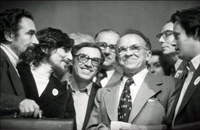Like Boris Lehman’s autobiographical essay Looking for my Birthplace, Albert Solé’s Bucharest, Memory Lost is a search for identity – the reconstruction of a past that has been lost in the shadows of turbulent history, exile, and parental silence. For Solé, the ambiguity of his nationality as a young boy – his parents having alternately referred to Paris, Budapest, and finally Bucharest as his birthplace – foregrounds a childhood lived in clandestiny as an unwitting participant within the Spanish resistance movement. The son of Jordi Solé Tura, an intellectual and partisan from Cal Pinyonaire who was radicalized by his first-hand experience with the intimidation and forced assimilation of Catalonians by Francoists, and Anny Bruset, the politically committed, French-born daughter of Communist party loyalists who fled Spain after the defeat of the Second Republic in 1939, Solé’s childhood would be spent infiltrating porous borders between Eastern and Western Europe using a trail of disposable aliases, disguises, and false documentation in order to broadcast information critical of the repressive Franco regime (often exposing abuses documented from notes smuggled in false bottom canisters passed by political prisoners), as well as organize national strikes from an underground, independent Spanish radio station in Bucharest known as La Pirenaica (intentionally misnamed to give a false impression that the station was located in the Pyrenees). Calling attention to the capture and subsequent execution of Communist party leader, Julián Grimau despite pleas for leniency from the international community, Solé’s father, Jordi would emerge as an important figure in the resistance in his role as La Pirenaica newscaster, Josep Oriol, before fleeing Bucharest after the death of Soviet aligned Gheorghiu-Dej and the emergence of the Securitate. Returning in exile to Paris, Solé’s family would continue to work in the resistance until an internal rift over policy between those aligned with party leaders, Dolores Ibárruri Gómez (known as “La Pasionaria”) and Santiago Carrillo, and the party’s leading intellectuals, Jorge Semprún and Fernando Claudín (caused, in part, by their reservations over the party’s alignment with the increasingly repressive government of the Soviet Union) would lead to Jordi’s expulsion from the party – consequently bringing an end to the family’s life in clandestiny – and pave the way for their relocation to Spain, and a renewed struggle for true democracy and representation.
But beyond an intimate account of Jordi Solé’s remarkable evolution from impoverished baker’s son, to revolutionary, to one of the key architects of the Spanish Constitution of 1978, to distinguished parliamentarian and cultural minister, the film also examines the disjunction between national history and personal memory. Paralleling his own faint memories of childhood with his father’s struggle against the advanced stages of Alzheimer’s disease and his mother’s subsequent hospitalization from a cerebral embolism, Solé frames his experience within the broader context of a cultural amnesia, where truth becomes increasingly relegated to the realm of myth, and the history of the resistance has been equally romanticized by revisionists (in one scene, the old site of La Pirenaica, having been converted to a Securitate office after the disbanding of the radio station, is now marketed as a neo-socialism historical site after the fall of Ceaucescu), exploited for political means (most notably, in politicians claiming the distinction as one of the “Fathers of the Constitution” even though only a handful of the convened group actually participated in its drafting), and taken for granted by a post Franco-era generation. Visually, Solé reflects this disjunction by incorporating secondary images into the personal interviews – archival newsreels, family photographs, footage from Alain Resnais’s La Guerre est finie (from a script by Semprún), iconic paintings (in particular, Pablo Picasso’s Guernica which provided an implicit expression of solidarity among members of the resistance), and graphics from comic book superhero, Captain Thunder (penned by popular comics writer and secret Communist party member, Victór Mora) – that figuratively fill the void of incomplete, fragmented memories. Juxtaposed against a neurologist’s diagnosis that Jordi’s illness has entered a depersonalization phase where he has difficulty recognizing himself and the stories of his life, Solé reflects on his father’s condition as a both a personal and cultural tragedy – a memory gradually being erased by the ravages of time, and within it, the dilution of a nation’s collective consciousness.
© Acquarello 2008. All rights reserved.
